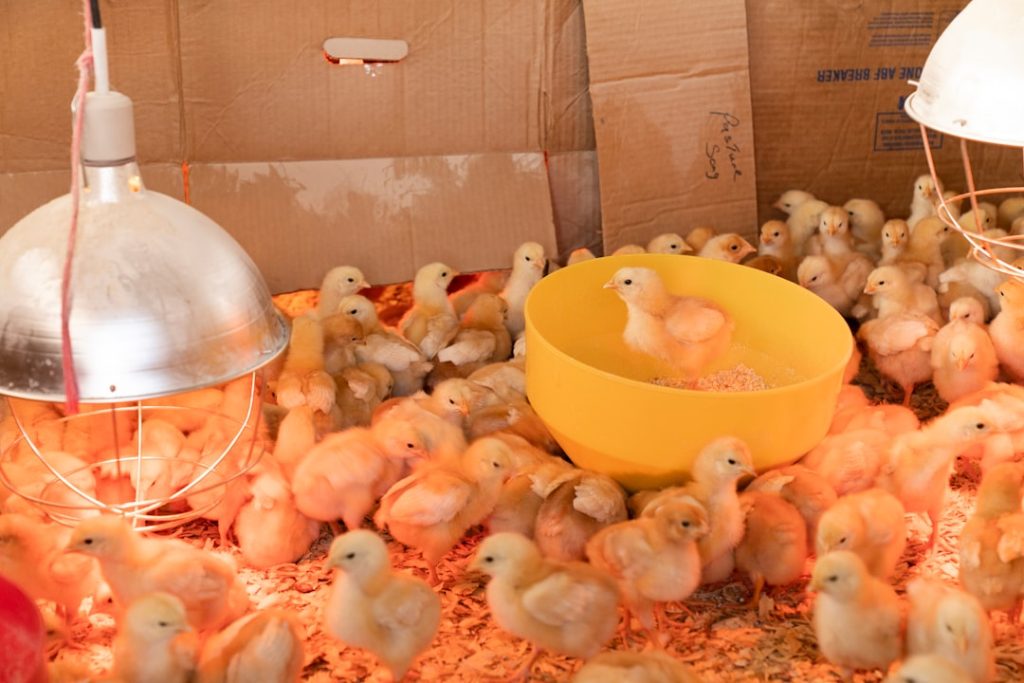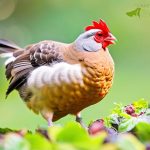Chickens are resilient animals capable of adapting to various temperatures, but they have specific thermal requirements for optimal health and productivity. The ideal temperature range for chickens is typically between 65-75°F (18-24°C). Within this range, chickens can maintain their body temperature efficiently without expending excessive energy on thermoregulation.
Temperatures below this range can cause stress and potentially reduce egg production. Conversely, temperatures above this range may lead to heat stress, resulting in decreased egg production, stunted growth, and in severe cases, mortality. To ensure chicken welfare and productivity, it is crucial to monitor coop temperatures and make necessary adjustments.
This can be accomplished by installing a thermometer in the coop or by observing chicken behavior. Understanding and maintaining the ideal temperature range for chickens is essential for creating an optimal environment that promotes their health and egg production.
Table of Contents
- 1 Factors Affecting the Temperature Needs of Chickens
- 2 Recommended Temperature Range for Different Stages of Chicken Development
- 3 Signs of Chickens Being Too Cold or Too Hot
- 4 Methods for Keeping Chickens Warm in Cold Weather
- 5 Tips for Keeping Chickens Cool in Hot Weather
- 6 Finding the Right Balance for Your Flock
- 7 FAQs
Key Takeaways
- Chickens prefer a temperature range of 65-75°F, but can tolerate temperatures between 45-85°F.
- Factors affecting temperature needs include breed, age, feathering, and health of the chickens.
- Recommended temperature ranges for different stages of chicken development are: 90-95°F for chicks, 85-90°F for young chickens, and 65-75°F for adult chickens.
- Signs of chickens being too cold include huddling together, shivering, and decreased egg production, while signs of being too hot include panting, holding wings away from the body, and decreased egg production.
- Methods for keeping chickens warm in cold weather include providing a draft-free coop, using heat lamps, and insulating the coop, while tips for keeping chickens cool in hot weather include providing shade, ventilation, and cool water.
- Finding the right balance for your flock involves monitoring their behavior and adjusting their environment accordingly to ensure their comfort and well-being.
Factors Affecting the Temperature Needs of Chickens
Age and Development
Young chicks, for instance, require a higher temperature (around 95°F or 35°C) during their first week of life. The temperature should gradually decrease by 5°F each week until they reach 6 weeks of age. This is because young chicks are not able to regulate their body temperature as effectively as adult chickens and need a warmer environment to thrive.
Breed and Cold Hardiness
The breed of chicken also plays a significant role in their temperature needs. Some breeds are more cold-hardy than others. For example, breeds like the Rhode Island Red and Plymouth Rock are known for their ability to withstand colder temperatures, while Mediterranean breeds like Leghorns are better suited for warmer climates.
Feathering and Body Temperature Regulation
The feathering of the chicken can also affect their ability to regulate body temperature. Chickens with thicker, fuller feathers are better equipped to handle colder temperatures, while those with lighter or thinner feathers may struggle in colder weather.
Overall Health and Temperature Tolerance
Overall health also plays a crucial role in a chicken’s ability to handle temperature extremes. Sick or injured chickens may have a harder time regulating their body temperature. By considering these factors, you can better understand the specific temperature needs of your flock and make adjustments as needed to ensure their comfort and well-being.
Recommended Temperature Range for Different Stages of Chicken Development

The temperature needs of chickens vary depending on their stage of development. For young chicks, the recommended temperature range is between 85-90 degrees Fahrenheit (29-32 degrees Celsius) during the first week of life, with the temperature decreasing by 5 degrees each week until they reach 6 weeks of age. This gradual decrease in temperature allows the chicks to acclimate to cooler conditions as they grow and develop.
For adult chickens, the ideal temperature range is between 65-75 degrees Fahrenheit (18-24 degrees Celsius). This range allows adult chickens to maintain their body temperature without expending too much energy to stay warm or cool. However, it’s important to note that extreme temperatures, whether hot or cold, can still have a negative impact on adult chickens, so it’s important to monitor the temperature in their environment and make adjustments as needed.
By understanding the recommended temperature range for different stages of chicken development, you can provide your flock with the best possible environment to thrive and grow.
Signs of Chickens Being Too Cold or Too Hot
It’s important to be able to recognize the signs of chickens being too cold or too hot so that you can make adjustments to their environment as needed. When chickens are too cold, they may huddle together for warmth, fluff up their feathers to trap air and create insulation, and show signs of shivering or lethargy. In extreme cases, chickens may suffer from frostbite on their combs, wattles, and feet.
On the other hand, when chickens are too hot, they may pant excessively, hold their wings away from their bodies to release heat, and show signs of lethargy or decreased egg production. In severe cases of heat stress, chickens may collapse or die. By being aware of these signs, you can take proactive measures to keep your flock comfortable and healthy in all weather conditions.
Methods for Keeping Chickens Warm in Cold Weather
There are several methods for keeping chickens warm in cold weather. One effective method is to insulate the chicken coop by adding extra bedding such as straw or wood shavings to provide insulation from the cold ground. You can also use heat lamps or heated pads to provide additional warmth in the coop, but it’s important to use these with caution as they can pose a fire hazard if not used properly.
Another method is to provide your chickens with a draft-free environment by sealing any gaps or cracks in the coop to prevent cold air from entering. Additionally, providing your chickens with a high-quality diet rich in protein and energy can help them generate body heat to stay warm in cold weather. By implementing these methods, you can help your flock stay comfortable and healthy during the colder months.
Tips for Keeping Chickens Cool in Hot Weather

Providing Shade and Cooling
In hot weather, it’s essential to take measures to keep your chickens cool and prevent heat stress. One effective method is to provide shade in the chicken run by using tarps or planting trees and shrubs to create natural shade. You can also use fans or misters to provide additional cooling in the coop, but it’s crucial to ensure proper ventilation to prevent moisture buildup.
Hydration is Key
Another method is to provide your chickens with plenty of fresh, cool water to stay hydrated and regulate their body temperature. This is vital in hot weather to prevent dehydration and heat stress.
Frozen Treats for a Cooler Flock
Additionally, providing your chickens with frozen treats such as fruits and vegetables can help them cool down and provide additional hydration. This is a great way to keep your flock comfortable and happy during the hotter months.
A Healthy and Happy Flock
By implementing these tips, you can help your flock stay comfortable and healthy during the hotter months. Remember, keeping your chickens cool and hydrated is crucial to their overall health and well-being.
Finding the Right Balance for Your Flock
In conclusion, understanding the ideal temperature for chickens and taking proactive measures to meet their specific temperature needs is essential for ensuring the health and well-being of your flock. By considering factors such as age, breed, feathering, and overall health, you can better understand the specific temperature needs of your chickens and make adjustments as needed to keep them comfortable in all weather conditions. Whether it’s providing warmth in cold weather or keeping cool in hot weather, there are several methods and tips that can help you maintain the right balance for your flock.
By being attentive to their behavior and making adjustments as needed, you can create an environment that allows your chickens to thrive and produce high-quality eggs year-round.
If you’re wondering how warm you need to keep your chickens, you may also be interested in learning about the importance of providing a comfortable and safe environment for your flock. Check out this article on chicken coop nest boxes to ensure that your chickens have a cozy place to lay their eggs. Creating a comfortable and inviting space for your chickens is essential for their overall health and well-being.
FAQs
What is the ideal temperature for keeping chickens warm?
The ideal temperature for keeping chickens warm is between 50-70 degrees Fahrenheit.
Do chickens need supplemental heat in the winter?
Chickens generally do not need supplemental heat in the winter if they are provided with a well-insulated coop and appropriate bedding.
What are the risks of keeping chickens too warm?
Keeping chickens too warm can lead to heat stress, which can cause decreased egg production, decreased appetite, and even death in extreme cases.
How can I keep my chickens warm in cold weather?
To keep chickens warm in cold weather, provide a well-insulated coop, adequate bedding, and access to fresh water. Additionally, consider using heat lamps or heated waterers if necessary.
At what temperature do chickens start to feel cold?
Chickens can start to feel cold when the temperature drops below 50 degrees Fahrenheit, especially if they are not acclimated to colder temperatures.
Meet Walter, the feathered-friend fanatic of Florida! Nestled in the sunshine state, Walter struts through life with his feathered companions, clucking his way to happiness. With a coop that’s fancier than a five-star hotel, he’s the Don Juan of the chicken world. When he’s not teaching his hens to do the cha-cha, you’ll find him in a heated debate with his prized rooster, Sir Clucks-a-Lot. Walter’s poultry passion is no yolk; he’s the sunny-side-up guy you never knew you needed in your flock of friends!







